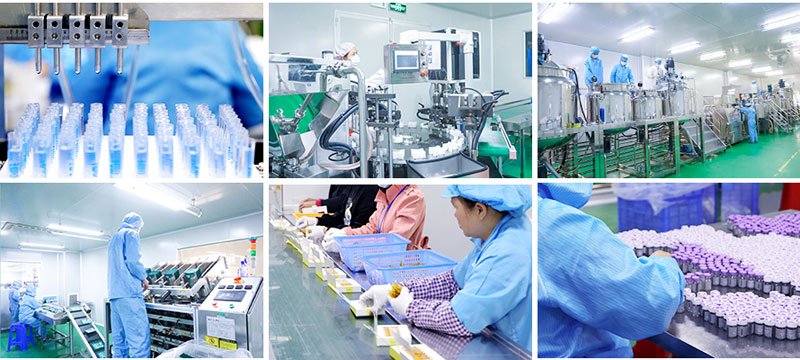Picture this: you own a small cosmetics company. You have a great product but can’t find the proper manufacturer to help you bring your vision to life. You’ve tried working with different manufacturers, but it’s just not working out.
What do you do?
One option is to contract cosmetic manufacturing. This type of manufacturing allows you to have more control over your product and can be an excellent option for small businesses.
This blog post will discuss everything you need about contract cosmetic manufacturing, including the benefits and drawbacks. We’ll also provide tips on finding the proper manufacturer for your business.
What Is Contract Cosmetic Manufacturing?
Contract cosmetic manufacturing is a manufacturing agreement between a cosmetics company and a manufacturer. In this type of arrangement, the cosmetics company contracts the manufacturing of its product to the manufacturer.
The manufacturer is then responsible for producing the product according to the specifications provided by the cosmetics company.
Contract manufacturing differs from private label manufacturing in that, with private labeling, the cosmetic company provides the manufacturer with its formulation and recipe. The manufacturer then produces the product according to the company’s specifications.
The manufacturer creates its formula and recipe for the product with contract manufacturing.
Contract cosmetic manufacturing can be an excellent option for small businesses that want more control over their product. It can also be a good option if you’re having difficulty finding a private label manufacturer that is a good fit for your business.
Consider a cosmetics manufacturing operation that requires using a pricey piece of equipment that a firm does not own. In such circumstances, rather than purchasing it, this business may outsource the production to another company that already has that specific piece of machinery or equipment.
In many cases, contract cosmetic manufacturers can produce products faster and more efficiently than their clients could on their own.
Contract manufacturing is also excellent for a cosmetic brand with a line of beauty products such as nail polish, skin care, hair care, body care, and beauty products. The same company can do all aspects of production with contract manufacturing, from creating the formula to manufacturing and packaging the final product.

Benefits of Using a Contract Manufacturer or Custom Manufacturer
Here are some benefits of using contract manufacturing brands:
Save Long-Term Costs
A company that doesn’t have the proper equipment to manufacture a product will likely have to outsource the production of that product. The company will then be responsible for quality assurance, materials, shipping, and other associated costs.
If a company outsources the production of a product, they are only responsible for the cost of materials and shipping. The company is not responsible for the cost of the equipment or the labor associated with manufacturing the product but for quality assurance and custom formulation. It saves a company a significant amount of money in the long run.
Scalability Opportunities
A company looking to expand its product line may not have the space or equipment to accommodate a new product. By outsourcing the production of a new product, the company can scale its business without investing in additional manufacturing equipment or facilities.
This can be an excellent way for brands to test new products without incurring many risks.
Technical Expertise
Often, contract manufacturers have a wealth of knowledge and experience that companies can benefit from.
Companies can tap into this expertise by working with a contract manufacturer and learning from the best in the business. This can help them improve their manufacturing processes and create better products.
Lead Time Reduction
One of the main benefits of using a contract manufacturer is the reduction in lead time. Lead time is the time it takes to complete a manufacturing process from start to finish.
Contract producers have streamlined processes and efficient systems that allow them to manufacture products quickly and efficiently. It saves brands a lot of time and money.
Increased Flexibility
Another benefit of working with a contract manufacturer in the cosmetics industry is its increased flexibility.
Companies that outsource their manufacturing needs can be more flexible with their production schedules. They can make changes to their products quickly and easily without having to invest in new equipment or hire additional staff.
This flexibility can be a significant advantage for brands that need to make changes to their products regularly.
Lower Overheads
Another significant benefit of working with a contract manufacturer is the lower overhead costs.
When a company outsources its manufacturing needs, it doesn’t have to invest in manufacturing equipment or facilities. It doesn’t have to hire additional staff to manage the manufacturing process. This can lead to significant savings for the company.
Improved Quality Control
One of the main benefits of working with a contract manufacturer is improved quality control. Contract manufacturers have strict quality control procedures to ensure that all products meet the highest standards. They also have access to state-of-the-art equipment that allows them to test products quickly and efficiently. This can lead to significant improvements in the grade of a company’s products.

Factors to Consider When Choosing a Contract Manufacturer
There are a few key considerations to keep in mind when choosing a contract manufacturer.
Scalability
A key consideration when choosing a contract manufacturer is the ability to increase or decrease output depending on demand, ensuring a suitable custom formulation. It is essential for businesses that experience seasonal fluctuations in the market.
A contract manufacturer that can quickly ramp up production to meet increased demand can help a business avoid lost sales and disappointed customers. Conversely, a contract manufacturer that can decrease production during periods of low demand can help a company save on manufacturing costs.
Flexibly responding to changes in demand is a crucial differentiator for contract manufacturers, and it should be a key consideration when choosing a provider.
Reputation
When choosing a contract manufacturer, one of the key considerations should be the company’s reputation. A well-established contract manufacturer will have a good track record with its clients and can provide references upon request.
The company’s reputation will also be evident in the quality of its products and services. Make sure to do your research before deciding, and choose a company with a good reputation and manufacturing capabilities in the industry. Also, uses of this constitute acceptance of custom manufacturer privacy policy.
Expenses
One of the critical considerations when choosing a contract manufacturer is the cost of their services. Get quotes from multiple providers before deciding, and ensure you understand all the costs involved. Sometimes, it may be worth paying slightly more for a company with a good reputation and high-grade products and services.
Communication
Good communication is essential for any business relationship, but it is crucial when working with a contract manufacturer. Make sure you choose a company that is easy to communicate with and responsive to your needs.
You should also ensure that the company’s employees are fluent in English (or your chosen language) to avoid misunderstandings.
Equipment and Technology
Another critical consideration when choosing a contract manufacturer is their equipment and technology. Make sure good custom manufacturer and choose a company that uses state-of-the-art equipment and the latest technologies such as packaging components and raw materials.
FDA Approval
If your product is for use in the United States, it is essential to choose an FDA-approved contract manufacturer. The FDA has strict guidelines that must be followed to manufacture products for use in the US. If the company is not FDA-approved, it will likely not be able to manufacture your product.
Research and Development
Another critical consideration is the company’s research and development capabilities when choosing a contract manufacturer. Make sure to choose a company that can develop new products and improves existing outcomes. Their good manufacturing practices will help ensure that your product is of the highest grade.
Location
Another critical consideration when choosing a contract manufacturer is the company’s location. Select a company in a country with stable political and economic conditions that will attract international buyers.
It will help ensure that your products are manufactured on time and without disruptions.
Employees
Ensure that the contract manufacturer you choose has enough development team to meet your production needs. If the company does not have enough employees, they may be unable to meet your deadline.
In addition, make sure that the company’s employees are adequately trained and have the necessary skills to manufacture your product. Otherwise, you may end up with a subpar product.
Experience
When choosing a contract manufacturer, you should consider the company’s experience. Make sure to select an FDA-registered company with experience manufacturing products similar to yours. It will help ensure that your product is manufactured to the highest quality standards.

How Do You Get Started With Contract Cosmetic Manufacturing?
Here are the top seven tips to help you get started:
Define Your Product
The first step is to define your product. What are its specifications? What ingredients will you need? What packaging will you use?
Find the Right Manufacturer
Once you have defined your product, research a Contract Manufacturer who can produce it. Many industries specialize in Contract Cosmetic Manufacturing, so take your time to find an FDA-registered one that meets your needs.
Negotiate the Contract
Once you have found a Contract Manufacturer, the next step is negotiating the contract. It is an essential step as it will determine your products’ price, quality, and delivery. Set clear expectations and agree on all terms before signing the contract.
Set up Quality Control
Quality control is essential in Contract Cosmetic Manufacturing. Be sure to set up clear guidelines and procedures with your Contract Manufacturer so that your products meet your standards.
Agreement on Lead Time for Production
It’s essential to agree on a lead time for production so there are no delays in receiving your products. Be sure to discuss this with your Contract Manufacturer and agree on a timeline that works for both parties.
Monitor Production Progress
You should monitor production progress to ensure that your products are manufactured according to schedule and meet your quality standards.
Acceptance of Goods
Once the products have been manufactured, they need to be inspected and approved before they are shipped to you. This step ensures that you are satisfied with the finished product. Contract Cosmetic Manufacturing can be a great way to reduce costs and improve product quality.

Wrapping Up
Now that you know the ins and outs of Contract Cosmetic Manufacturing, it’s time to find the proper manufacturer for your business. Keep these tips in mind to ensure a smooth process and high-quality products.
By working with a reputable manufacturer and monitoring production closely, you can ensure that your experience with contract production is positive and successful.

